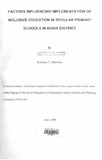| dc.description.abstract | The purpose of this study was to investigate the factors that influence the implementation of inclusive education in the regular primary schools in Busia District. The researcher used survey design. The design helped the researcher to obtain information that described the existing phenomena such as factors that influence the implementation of inelusive education. This was done by asking respondents about their education, attitudes or value and conditions of service at their work places. In this case, the researcher explored the existing status of variables such as status of teachers.
Cluster sampling was used for sampling the population. All the nine schools that practised inclusive education in the district were included in the study. The instruments of the study were: An interview schedule for head teachers to find out their attitudes, feelings, knowledge and skills about implementing inclusive education and the teachers' questionnaire chosen because the
target respondents were literate. The instruments' validity was ascertained by conducting a pilot study. The researcher used the split-half technique of assessing reliability done by using the spearman-brown prophecy formula. Data were collected by the researcher personally administering research instruments in the schools. Data were analysed as guided by a Computer
Programmer such that descriptive statistics were used. The analysed data formed the basis for the research findings, conclusions and recommendations [or the study.
Findings in the study included the following, free primary education contributed to high enrolments in all schools and special units. Teachers were well prepared for the mainstream education but not for children with special needs in education, the government provided adequate teaching/learning resources like textbooks but not alternative learning media like radios, | en |

